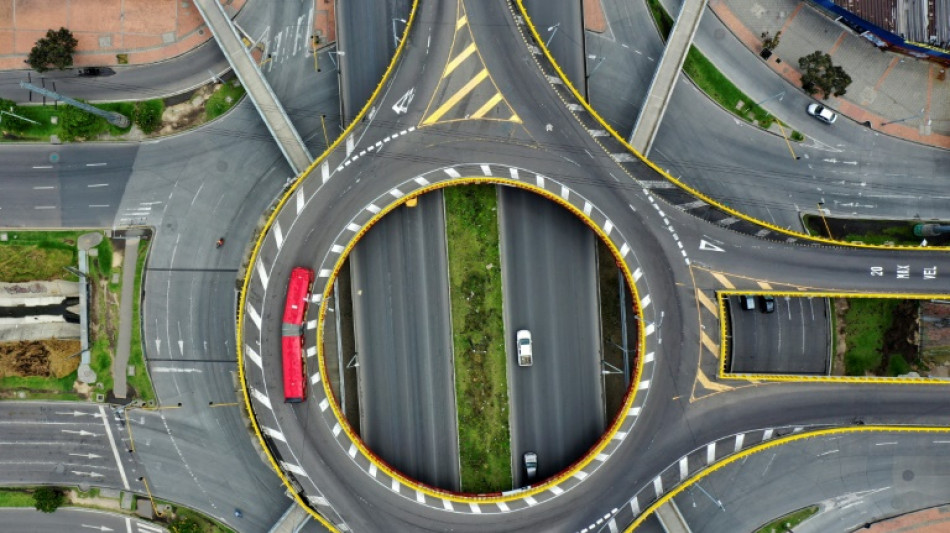
-
 From misfits to MAGA: Nicki Minaj's political whiplash
From misfits to MAGA: Nicki Minaj's political whiplash
-
Foster grabs South Africa winner against Angola in AFCON

-
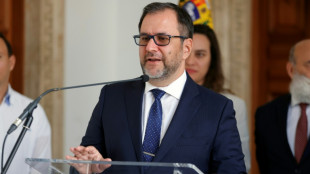 Russia pledges 'full support' for Venezuela against US 'hostilities'
Russia pledges 'full support' for Venezuela against US 'hostilities'
-
Spotify says piracy activists hacked its music catalogue

-
 Winter Olympics organisers resolve snow problem at ski site
Winter Olympics organisers resolve snow problem at ski site
-
Fuming Denmark summons US ambassador over Greenland envoy
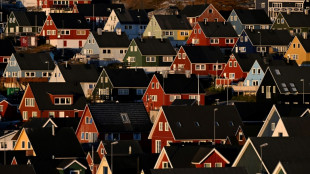
-
 UK's street artist Banksy unveils latest mural in London
UK's street artist Banksy unveils latest mural in London
-
Rugby players lose order challenge in brain injury claim

-
 UK singer Chris Rea dies at 74, days before Christmas
UK singer Chris Rea dies at 74, days before Christmas
-
Last of kidnapped Nigerian pupils handed over, government says

-
 Zambia strike late to hold Mali in AFCON opener
Zambia strike late to hold Mali in AFCON opener
-
Outcry follows CBS pulling program on prison key to Trump deportations
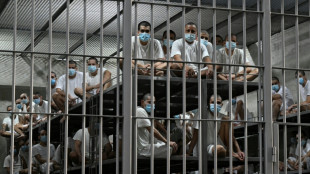
-
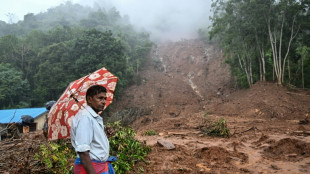 Sri Lanka cyclone caused $4.1 bn damage: World Bank
Sri Lanka cyclone caused $4.1 bn damage: World Bank
-
Billionaire Ellison offers personal guarantee for son's bid for Warner Bros

-
 Tech stocks lead Wall Street higher, gold hits fresh record
Tech stocks lead Wall Street higher, gold hits fresh record
-
Telefonica to shed around 5,500 jobs in Spain

-
 McCullum wants to stay as England coach despite Ashes drubbing
McCullum wants to stay as England coach despite Ashes drubbing
-
EU slams China dairy duties as 'unjustified'
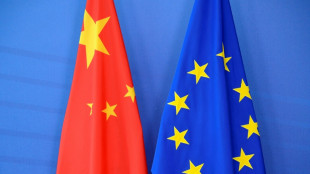
-
 Italy fines Apple nearly 100 mn euros over app privacy feature
Italy fines Apple nearly 100 mn euros over app privacy feature
-
America's Cup switches to two-year cycle

-
 Jesus could start for Arsenal in League Cup, says Arteta
Jesus could start for Arsenal in League Cup, says Arteta
-
EU to probe Czech aid for two nuclear units
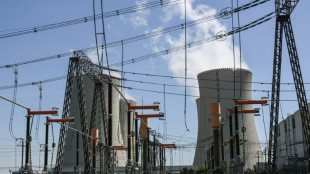
-
 Strauss says sacking Stokes and McCullum will not solve England's Ashes woes
Strauss says sacking Stokes and McCullum will not solve England's Ashes woes
-
Noel takes narrow lead after Alta Badia slalom first run

-
 Stocks diverge as rate hopes rise, AI fears ease
Stocks diverge as rate hopes rise, AI fears ease
-
Man City players face Christmas weigh-in as Guardiola issues 'fatty' warning

-
 German Christmas markets hit by flood of fake news
German Christmas markets hit by flood of fake news
-
Liverpool fear Isak has broken leg: reports

-
 West Indies captain says he 'let the team down' in New Zealand Tests
West Indies captain says he 'let the team down' in New Zealand Tests
-
Thailand says Cambodia agrees to border talks after ASEAN meet

-
 Alleged Bondi shooters conducted 'tactical' training in countryside, Australian police say
Alleged Bondi shooters conducted 'tactical' training in countryside, Australian police say
-
Swiss court to hear landmark climate case against cement giant

-
 Knicks' Brunson scores 47, Bulls edge Hawks epic
Knicks' Brunson scores 47, Bulls edge Hawks epic
-
Global nuclear arms control under pressure in 2026
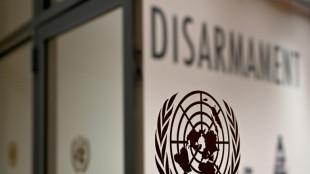
-
 Asian markets rally with Wall St as rate hopes rise, AI fears ease
Asian markets rally with Wall St as rate hopes rise, AI fears ease
-
Jailed Malaysian ex-PM Najib loses bid for house arrest

-
 Banned film exposes Hong Kong's censorship trend, director says
Banned film exposes Hong Kong's censorship trend, director says
-
Duffy, Patel force West Indies collapse as NZ close in on Test series win

-
 Australian state pushes tough gun laws, 'terror symbols' ban after shooting
Australian state pushes tough gun laws, 'terror symbols' ban after shooting
-
A night out on the town during Nigeria's 'Detty December'

-
 US in 'pursuit' of third oil tanker in Caribbean: official
US in 'pursuit' of third oil tanker in Caribbean: official
-
CO2 soon to be buried under North Sea oil platform

-
 Steelers edge Lions as Bears, 49ers reach playoffs
Steelers edge Lions as Bears, 49ers reach playoffs
-
India's Bollywood counts costs as star fees squeeze profits

-
 McCullum admits errors in Ashes preparations as England look to salvage pride
McCullum admits errors in Ashes preparations as England look to salvage pride
-
Pets, pedis and peppermints: When the diva is a donkey

-
 'A den of bandits': Rwanda closes thousands of evangelical churches
'A den of bandits': Rwanda closes thousands of evangelical churches
-
Southeast Asia bloc meets to press Thailand, Cambodia on truce

-
 As US battles China on AI, some companies choose Chinese
As US battles China on AI, some companies choose Chinese
-
AI resurrections of dead celebrities amuse and rankle


Study explains surprise surge in methane during pandemic lockdown
A mysterious surge in planet-heating atmospheric methane in 2020 despite Covid lockdowns that reduced many human-caused sources can be explained by a greater release from nature and, surprisingly, reduced air pollution, scientists said Wednesday.
Methane stays in the atmosphere only a fraction as long as carbon dioxide, but is far more efficient at trapping heat and is responsible for roughly 30 percent of the global rise in temperatures to date.
Released from the oil and gas, waste and agriculture sectors, as well as through biological processes in wetlands, the powerful greenhouse gas is a key target for efforts to curb global warming.
But a new study published in the journal Nature suggests that cutting methane may be even more of a challenge -- and more urgent -- than is currently understood.
Researchers in China, France, the US and Norway found that efforts to reduce CO2 emissions and air pollution will affect the atmospheric process that scrubs methane from the air. That means the planet-heating gas will linger longer and accumulate faster.
If the world is to meet the challenge of keeping warming to under 2 degrees Celsius since the pre-industrial era, "we will have to act even more quickly and even more strongly to reduce methane", said Philippe Ciais who co-led the research at France's Laboratory for the Sciences of Climate and Environment (LSCE).
The researchers focused on the mystery of the concentrations of methane in the atmosphere in 2020, which had their biggest increase on record even as Covid-19 lockdowns saw carbon dioxide emissions fall.
- 'Bad news' -
What they found is potentially two pieces of "bad news" for climate change, said co-author Marielle Saunois of (LSCE).
Firstly, they looked at inventories to assess fossil fuel and agricultural methane emissions and found that human sources of methane did indeed fall slightly in 2020.
Then they used ecosystem models to estimate that warmer and wetter conditions over parts of the northern hemisphere caused a surge in emissions from wetlands.
That confirms other research and is worrying because the more methane released, the more warming, potentially creating a feedback loop largely outside of human control.
But that is only half of the story, the researchers found.
Researchers also looked at changes in atmospheric chemistry, because this provides a "sink" for methane, effectively cleaning it out of the air in a relatively short period by converting it to water and CO2 when it reacts with the hydroxyl radical (OH).
These hydroxyl radicals are present in tiny quantities and have a lifetime of less than a second, but they remove about 85 percent of methane from the atmosphere.
They are the "Pac-Man of the atmosphere", said Ciais: "As soon as they see something they eat it and then disappear."
- 'Dramatic' -
The researchers simulated changes in OH using human sources of carbon monoxide, hydrocarbons and nitrogen oxide emissions that altogether affect the production and loss of hydroxyl radicals in the atmosphere.
They found that OH concentrations decreased by around 1.6 percent in 2020 from the year before, largely because of a fall in nitrogen oxide (NOx) emissions caused by the Covid lockdowns. Nitrogen oxide is emitted into the air primarily from burning fuel.
A 20 percent reduction in NOx could increase methane twice as fast, Cias told a press briefing, adding: "This has surprised us greatly."
The researchers said their study helps to solve the riddle of the rise in methane in the atmosphere in 2020.
But they acknowledged that more work would have to be done to answer the next mystery: why the rise in methane concentrations hit a new record in 2021.
Ciais said lower nitrogen oxide emissions from transport in the United States and India, as well as continued low levels of air travel due to the pandemic may have played a part.
Euan Nisbet, a professor of Earth Sciences at Royal Holloway University who was not involved in the research, said the jump in methane in 2020 was a "major shock".
"Even more worrying is the rise in methane in 2021 -- this was after the major Coronavirus shutdowns when the economy was recovering," he told AFP.
"As yet we don't have detailed studies but something very dramatic seems to be going on."
X.Karnes--AMWN



